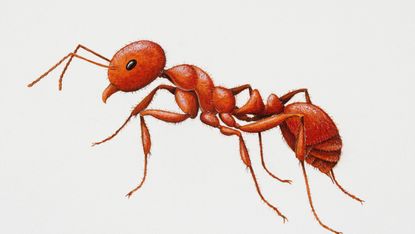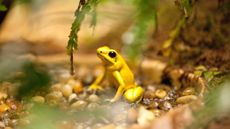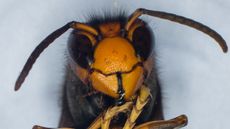The red fire ant invasion 'creeping closer' to London
Deadly insect considered one of world's most invasive species has been spotted in Europe for first time

A free daily digest of the biggest news stories of the day - and the best features from our website
Thank you for signing up to TheWeek. You will receive a verification email shortly.
There was a problem. Please refresh the page and try again.
Deadly red fire ants may "invade" Britain, researchers have warned after the first official sighting of colonies in Europe.
Entomologists have found 88 red fire ant nests spread over five hectares near the city of Syracuse on the Italian island of Sicily, said The Telegraph's science editor Sarah Knapton. And according to a new study, London is a "prime candidate for colonisation", she added.
Causing death and destruction
Considered to be one of the world's most invasive species, fire red ants can deliver a bite or sting that causes a burning sensation and, in some cases, chest pains, nausea and dizziness.
Subscribe to The Week
Escape your echo chamber. Get the facts behind the news, plus analysis from multiple perspectives.

Sign up for The Week's Free Newsletters
From our morning news briefing to a weekly Good News Newsletter, get the best of The Week delivered directly to your inbox.
From our morning news briefing to a weekly Good News Newsletter, get the best of The Week delivered directly to your inbox.
Their sting can also cause "nasty pustules and allergic reactions, possibly leading to anaphylactic shock", said the Daily Mail.
The ants have been responsible for more than 80 deaths in the US, where an estimated 14 million people are stung each year.
Not only humans are at risk. The species can rapidly form "super colonies" that "prey on invertebrates, larger vertebrates and plants, destroying native plants and out-competing native ants, insects and herbivores for food", said author and natural history writer Patrick Barkham in The Guardian.
The ants can also "infest electrical equipment including cars and computers", he added, as well as houses and crops.
Estimated to be the fifth most costly invasive species on the planet, the ants have spread through human trade from their native South America into Mexico, the Caribbean, Australia, China, Taiwan and the US, where they cause an estimated damage of $6 billion (£4.8 billion) each year.
‘Knew this day would come’
"Finding this species in Italy was a big surprise," said Mattia Menchetti from the Institute of Evolutionary Biology in Spain, "but we knew this day would come."
Genetic analyses by Menchetti and fellow researchers suggests that the invasive colonies could have come from China or the US. And an analysis of suitable habitats suggests that the ants could invade 7% of the European continent, the team said in a study published in Current Biology.
The species prefers farms and cities, and could possibly infest half of Europe's urban areas, according to the experts.
The scientists are now planning an “eradication campaign” in Sicily, said Science magazine's Erik Stokstad, and will "destroy the known nests" and search for more.
The area will also be monitored for several years to make sure no ants escape, and volunteers will be recruited from across Europe to keep an eye out for further infestations. "Citizens can play a very important role in this," said Menchetti.
Study co-author Roger Vila agreed that "coordinated efforts for early detection" and "rapid response" are essential to "successfully manage this new threat, before it spreads uncontrollably".
‘Don’t worry too much’
The "urgent alert" about the ants invasion comes as the "lethal and aggressive insect" is "creeping closer to Britain", said The Sun.
Amid mounting speculation about the potential threat, The Guardian's Jonathan Watts recalled his "painful" encounters with the ants while living in its native Latin America. During one attack, during a barbecue in his garden, he was stung "multiple times in rapid succession".
"As more and more joined the attack, the build-up of alkaloid poison turned my skin blotchy and the sensation felt less and less like a pinprick and more and more like a burn," he wrote.
All the same, Watts added, "I would not worry too much" about this potential invader. "Despite headlines about killer insects", the risks are "manageable for most people" provided "you are not allergic".

Continue reading for free
We hope you're enjoying The Week's refreshingly open-minded journalism.
Subscribed to The Week? Register your account with the same email as your subscription.
Sign up to our 10 Things You Need to Know Today newsletter
A free daily digest of the biggest news stories of the day - and the best features from our website
Chas Newkey-Burden has been part of The Week Digital team for more than a decade and a journalist for 25 years, starting out on the irreverent football weekly 90 Minutes, before moving to lifestyle magazines Loaded and Attitude. He was a columnist for The Big Issue and landed a world exclusive with David Beckham that became the weekly magazine’s bestselling issue. He now writes regularly for The Guardian, The Telegraph, The Independent, Metro, FourFourTwo and the i new site. He is also the author of a number of non-fiction books.
-
 Ben Fountain's 6 favorite books about Haiti
Ben Fountain's 6 favorite books about HaitiFeature The award-winning author recommends works by Marie Vieux-Chauvet, Katherine Dunham and more
By The Week Staff Published
-
 6 picturesque homes in apartments abroad
6 picturesque homes in apartments abroadFeature Featuring a wall of windows in Costa Rica and a luxury department store-turned-home in New Zealand
By The Week Staff Published
-
 Why 2023 has been the year of strikes and labor movements
Why 2023 has been the year of strikes and labor movementsThe Explainer From Hollywood to auto factories, workers are taking to the picket lines
By Justin Klawans Published
-
 Why frogs and other amphibious 'climate captives' are 'the world's most threatened animals'
Why frogs and other amphibious 'climate captives' are 'the world's most threatened animals'Speed Read Endangered mammals and birds get a lot of attention, but amphibians are faring much worse in this hotter world
By Peter Weber Published
-
 Asian hornets threaten ‘catastrophe’ for UK bees
Asian hornets threaten ‘catastrophe’ for UK beesSpeed Read Invasive species is gaining ‘foothold’ in southern England with ‘sharp rise’ in sightings
By Chas Newkey-Burden Published




